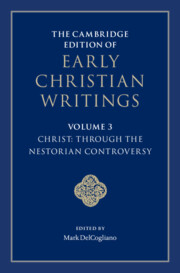Book contents
- The Cambridge Edition of Early Christian Writings
- The Cambridge Edition of Early Christian Writings
- The Cambridge Edition of Early Christian Writings
- Copyright page
- Contents
- Notes on Contributors
- Acknowledgments
- Note on the Texts and Translations
- Abbreviations
- Series Introduction
- Introduction
- Part I The Beginnings of Christology
- Part II Developing Christological Traditions
- Part III Traditions of Pro-Nicene Christology
- 21 Tome to the Antiochenes 7
- 22 Athanasius of Alexandria, Christological Letters to Epictetus, Adelphius, and Maximus
- 23 Apollinarius of Laodicea, Recapitulation
- 24 Apollinarius of Laodicea, Selected Letters
- 25 Apollinarius of Laodicea, On the Faith and the Incarnation
- 26 Apollinarius of Laodicea, On the Body’s Union with the Divinity in Christ
- 27 Apollinarius of Laodicea, Fragments of Other Writings
- 28 Apollinarius of Laodicea, Fragmentary Writings against Diodore and Flavian
- 29 Basil of Caesarea, Letters 261 and 262
- 30 Basil of Caesarea, Homily on the Holy Birth of Christ
- 31 Diodore of Tarsus, Selected Fragments
- 32 Gregory of Nazianzus, Letter 101 to Cledonius
- 33 Gregory of Nazianzus, Poems 1.1.10–11
- 34 Gregory of Nyssa, Oration on the Savior’s Nativity
- 35 Theodore of Mopsuestia, On the Incarnation of the Lord against the Apollinarians and Eunomians (Fragments)
- 36 Augustine of Hippo, On Eighty-Three Different Questions. Number 80: Against the Apollinarians
- 37 Augustine of Hippo, Letter 137
- 38 The Leporius Dossier
- 39 Theodoret of Cyrrhus, Exposition of the Orthodox Faith
- Part IV Controversy over Nestorius
- Suggestions for Further Reading
- Scriptural Index
22 - Athanasius of Alexandria, Christological Letters to Epictetus, Adelphius, and Maximus
from Part III - Traditions of Pro-Nicene Christology
Published online by Cambridge University Press: 05 February 2022
- The Cambridge Edition of Early Christian Writings
- The Cambridge Edition of Early Christian Writings
- The Cambridge Edition of Early Christian Writings
- Copyright page
- Contents
- Notes on Contributors
- Acknowledgments
- Note on the Texts and Translations
- Abbreviations
- Series Introduction
- Introduction
- Part I The Beginnings of Christology
- Part II Developing Christological Traditions
- Part III Traditions of Pro-Nicene Christology
- 21 Tome to the Antiochenes 7
- 22 Athanasius of Alexandria, Christological Letters to Epictetus, Adelphius, and Maximus
- 23 Apollinarius of Laodicea, Recapitulation
- 24 Apollinarius of Laodicea, Selected Letters
- 25 Apollinarius of Laodicea, On the Faith and the Incarnation
- 26 Apollinarius of Laodicea, On the Body’s Union with the Divinity in Christ
- 27 Apollinarius of Laodicea, Fragments of Other Writings
- 28 Apollinarius of Laodicea, Fragmentary Writings against Diodore and Flavian
- 29 Basil of Caesarea, Letters 261 and 262
- 30 Basil of Caesarea, Homily on the Holy Birth of Christ
- 31 Diodore of Tarsus, Selected Fragments
- 32 Gregory of Nazianzus, Letter 101 to Cledonius
- 33 Gregory of Nazianzus, Poems 1.1.10–11
- 34 Gregory of Nyssa, Oration on the Savior’s Nativity
- 35 Theodore of Mopsuestia, On the Incarnation of the Lord against the Apollinarians and Eunomians (Fragments)
- 36 Augustine of Hippo, On Eighty-Three Different Questions. Number 80: Against the Apollinarians
- 37 Augustine of Hippo, Letter 137
- 38 The Leporius Dossier
- 39 Theodoret of Cyrrhus, Exposition of the Orthodox Faith
- Part IV Controversy over Nestorius
- Suggestions for Further Reading
- Scriptural Index
Summary
Athanasius was bishop of Alexandria on and off for nearly fifty years, from his contested election in 328 until his death in 373. He is perhaps best known for the unflinching promotion of a theology which he claimed represented the traditional Christian viewpoints articulated at the Council of Nicaea, against Trinitarian heterodoxies he connected with Arius and those supposedly influenced by him. Various emperors irked by his ecclesio-political efforts deposed Athanasius from his see no less than five times, causing him to spend many years in exile. Though Athanasius is most famous for his defense of the Nicene doctrine of the Trinity, Christological concerns were never far from his mind and some works of his, or at least sections thereof, are even specifically Christological in focus. For example, On the Incarnation (composed ca. 328–335) is a meditation on the person of Christ and soteriology, arguing that the salvation of humanity could only be achieved through the fully divine Word becoming incarnate, whereas his Oration against the Arians 3.26–58 (early 340s) defends the reality of the incarnation of the Word against “Arian” scriptural arguments against it.
- Type
- Chapter
- Information
- The Cambridge Edition of Early Christian Writings , pp. 276 - 300Publisher: Cambridge University PressPrint publication year: 2022



